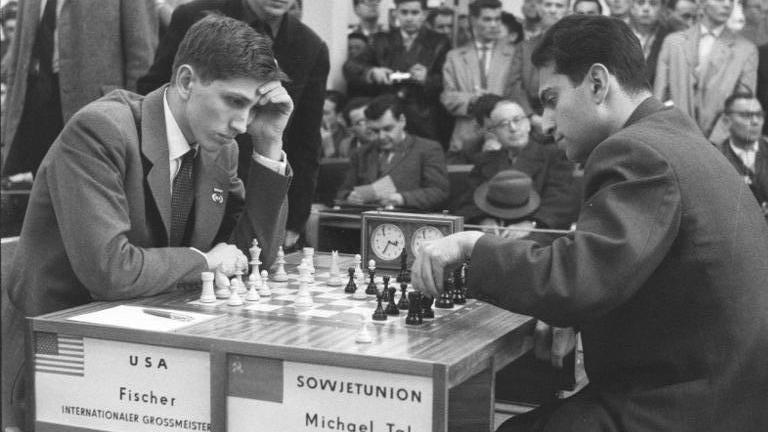
Fischer The Rebel
His whole life, Robert James Fischer was fighting against someone or something. Thousands of books, articles and videos have been produced to describe the outlandish behavior of the chess genius. It is difficult to count all the social, moral, and ethical rules that Fischer broke during his volatile lifespan.
Nevertheless, while a well-known chess saying insists that the way a person plays chess reflects his personality, here we have a major exception. In chess, Fischer was always an aristocrat. His style was logical, pure, and aesthetically pleasing.
Yet, like any truly great chess player, Fischer knew when he had to obey the general laws of chess and when he could break them to his advantage.

Today we are going to analyze some games in which Fischer rebelled against some major rules of chess.
Please remember, as I mentioned in this article, some games are not suitable for inexperienced players. These games can cause real harm if you try to blindly apply the major exceptions therein in your games.
Viewer discretion is advised!
The opening is all about development.
It is difficult to find a more important chess rule! Yet look at the following position from Fischer's play:
It looks like Black's moves were played by a beginner! Indeed, White has practically finished developing while Black has barely started getting his pieces out.
The position is wide open, and it feels like in about 10 moves White is going to checkmate the Black king with a beautiful sacrifice.
However, look at what happened in Fischer's games. Not only did he score 3.0/3 in the above-mentioned position, in one of the games, it was all over after just 10 more moves!
What's the method in Fischer's madness?
White's pawn structure on the queenside is completely ruined, and the overextended e5 pawn is weak. Meanwhile, Black doesn't have clear weaknesses. Add Black's extra pawn into the mix, and you can see why so many grandmasters have taken up the Poisoned Pawn variation of the Sicilian Defense.
Should you play similarly in your games? Absolutely not! Fischer found a major exception that probably occurs once in 10,000 games.

At least your odds are better than winning the lottery!
If you try to completely ignore the development of your pieces, the consequences are not going to be pretty!
Keep your king safe!
This is another rule you don't want to bend. Since the ultimate goal of chess is to checkmate the opponent's king, you really want to keep your monarch in a safe, cozy place.
In most cases,castlinghelps to achieve this goal. Now take a look at Fischer'scastlingin the following game; it looks anything but safe!
What's the method in Black's madness? Fischer gives the following comment in his book, My 60 Memorable Games.
"Petrosian and Tal both happened to stroll by the board at this instant. Petrosian made a wry face which looked to me like 'Can Black do this and live?'
Black's 'ugly' defense is based on sound positional considerations: once he can consolidate, there is a strong potential in the two bishops coupled with his beautifully posted Knight and compact pawn mass. These assets, in the long run, hopefully, should outweigh the temporary weakness of his king and the immobile target on e6."

World Champion Tigran Petrosian
Should you play similar moves in your games? Maybe. Especially if both players castle on the same side.
In this case, you can play Kh8, Rg8 and even use the 'g' file to attack your opponent's King. Here is another classical game that demonstrates the concept:
Do not trade your good pieces for your opponent's bad pieces!
This basic rule of positional play was not just broken in the following iconic game, it was practically embarrassed!
We have a classic example of "good knight" vs. "bad bishop", and yet Fischer trades his best piece for his opponent's worst one!
What's the method in Fischer's madness?
Here is GM Robert Byrne's funny observation from the match.
"This brought the house down! GM Miguel Najdorf jumped up and started shouting, 'My God!! He's crazy!! Such a knight! My God! How can he give such a knight for such a terrible bishop?'

GM Miguel Najdorf
Of course, no one else understood Bobby the way I did. You see I played a lot with Bobby and analyzed with him at length.
You see Bobby loved bishops. According to the way he played chess, Bobby was just driving the nails into the coffin. The bishop may look bad but it's not. The position is open. The c5-knight is great but it blocks the open c-file. Finally, the d3-bishop is so much superior to a knight when there are pawns on both sides of the board. Bobby was just using his principles."
Should you play similar moves in your games? Yes! Unlike the first two examples of breaking the chess rules, this one is relatively safe.
Therefore, even if you misjudge the position and break the rule in a situation where you were supposed to obey it, the consequences are not going to be so severe. You are not going to lose the game right away.
I would like to conclude this article with some simple advice. Exceptions from the general, time-proven rules of chess are not very common. When you have urge to break such rules, most probably you are wrong!






